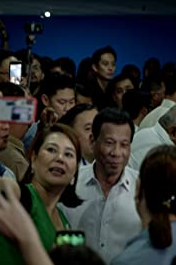A Thousand Cuts (Ramona Diaz, 2020): USA
Reviewed by Larry Gleeson. Viewed during the virtual 2020 AFI DOCS Film Festival. PBS Distribution and Frontline will release A Thousand Cuts August 2020.
 The virtual 2020 AFI DOCS, supported by presenting sponsor, AT & T, started off with a technical difficulty, unrecoverable on my end, for the Opening Night Film, Boys State. As a result, my opening film became Ramona Diaz’s A Thousand Cuts, a well-orchestrated feature documentary on the suppression of free speech, corruption, human rights violations, the impunity of the Presidency, and the proliferation of disinformation spread through government propaganda and social media sites after the 2016 Philippine election of a populist candidate, Rodrigo Duterte.
The virtual 2020 AFI DOCS, supported by presenting sponsor, AT & T, started off with a technical difficulty, unrecoverable on my end, for the Opening Night Film, Boys State. As a result, my opening film became Ramona Diaz’s A Thousand Cuts, a well-orchestrated feature documentary on the suppression of free speech, corruption, human rights violations, the impunity of the Presidency, and the proliferation of disinformation spread through government propaganda and social media sites after the 2016 Philippine election of a populist candidate, Rodrigo Duterte.
Diaz utilizes historical interview and news archives after the 2016 election of “strongman” Rodrigo Duterte and the culminating intersection of Maria Ressa’s Rappler, a news site run by Phillipino women speaking truth to power. Ressa, the Time Magazine 2018 Person of the Year, received a six-year sentence for cyber-libel four days ago for her stand on democracy and her vision for a Philippine society based in love and hope rather than in anger and fear. Amal Clooney, the wife of American Hollywood actor, George Clooney, both of whom appear in the film during some heady moments, provides representation to Ressa.
In addition, Diaz provides testimonials from a multitude of journalists and a celebrity political candidate, who becomes Duterte’s social media pawn, on the political situation in the streets and inside the Duterte government. Both direct cinema and cinema verite are woven into the film’s narrative adding substance and depth to the testimonials. In one capture, Ressa describes the global alternative news movement in the Philippines. Ressa uses graphs and a verbal explanation in revealing 25 bot-like sites, all following each other, to influence an immediate audience of three million while disseminating various untruths of misinformation. Ressa also explains to co-journalists how this messaging is then repeated millions of times with the end goal of creating doubt as to what facts are.
In archival footage following his election, Duterte begins calling traditional news outlets “fake news” and begins utilizing alt news sites to sow misinformation, creating a mob mentality as misogynistic comments to rape to death or to behead Ressa for her critical news reporting approach appear on social media. Vile and shocking screenshots of social media comments further substantiate Ressa’s journalistic claims and warrant further investigation. Martin Niemölle’s infamous “First they came:
First they came for the socialists, and I did not speak out—
Because I was not a socialist.Then they came for the trade unionists, and I did not speak out—
Because I was not a trade unionist.Then they came for the Jews, and I did not speak out—
Because I was not a Jew.Then they came for me—and there was no one left to speak for me.
is reduced with dramatic and telling effect by another journalist with, “First they came for the journalist, then no one knows what happened next.”
Unmistakably, a correlation with the Trump government surfaces even though only one image of the President of the United States is shown. The typical sexist (misogynistic) “locker room” talk is shown at a rally where Duterte connects the smell of fish to the scent of a woman, manipulates a podium microphone to illustrate a weak phallus, and promulgates a war on drugs vocally saying he will kill drug dealers.
Unsurprisingly, three hours after Duterte’s election, the first dead body is found in the street. Pushing aside due process and the rule of law, the Duterte government has killed thousands upon thousands of individuals leaving the bodies in the streets devastating family members and disrupting the family dynamic, disrupted constitutional checks and balances with an unchecked abuse of executive authority, and suppressed freedom of the press with slut-shaming tactics such as labeling female journalists “presstitutes” – in my opinion, the least derogatory term Duterte uses throughout A Thousand Cuts to describe the media and the female journalists depicted
The title of the film, A Thousand Cuts, refers to a small cut that doesn’t have much effect on the workings of democracy, yet when repeated over and over each small effect begins to damage the fabric of democracy until it becomes something else. An exceptionally well-made political documentary with a timely urgency and the soul democracy at its core. A “must-see” film.
About this entry
You’re currently reading “A Thousand Cuts (Ramona Diaz, 2020): USA,” an entry on Student Film Reviews
- Published:
- 06.18.20 / 1am
- Category:
- Documentary, Films
9 Comments
Jump to comment form | comments rss [?]